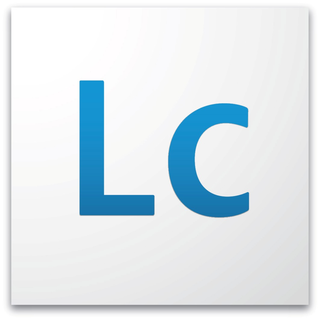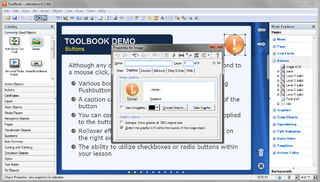Sharable Content Object Reference Model (SCORM) is a collection of standards and specifications for web-based electronic educational technology. It defines communications between client side content and a host system, which is commonly supported by a learning management system. SCORM also defines how content may be packaged into a transferable ZIP file called "Package Interchange Format."
Moodle is a free and open-source learning management system written in PHP and distributed under the GNU General Public License. Moodle is used for blended learning, distance education, flipped classroom and other online learning projects in schools, universities, workplaces and other sectors.
A content package is a file containing content in a database metadata.
Enterprise content management (ECM) extends the concept of content management by adding a timeline for each content item and, possibly, enforcing processes for its creation, approval, and distribution. Systems using ECM generally provide a secure repository for managed items, analog or digital. They also include one methods for importing content to manage new items, and several presentation methods to make items available for use. Although ECM content may be protected by digital rights management (DRM), it is not required. ECM is distinguished from general content management by its cognizance of the processes and procedures of the enterprise for which it is created.
A learning management system (LMS) or virtual learning environment (VLE) is a software application for the administration, documentation, tracking, reporting, automation, and delivery of educational courses, training programs, materials or learning and development programs. The learning management system concept emerged directly from e-Learning. Learning management systems make up the largest segment of the learning system market. The first introduction of the LMS was in the late 1990s. LMSs have been adopted by almost all higher education institutions in the English-speaking world. Learning management systems have faced a massive growth in usage due to the emphasis on remote learning during the COVID-19 pandemic.

The Aviation Industry Computer-Based Training Committee (AICC) was an international association of technology-based training professionals that existed from 1988 to 2014. The AICC developed guidelines for aviation industry in the development, delivery, and evaluation of CBT, WBT, and related training technologies.

Learning Object Metadata is a data model, usually encoded in XML, used to describe a learning object and similar digital resources used to support learning. The purpose of learning object metadata is to support the reusability of learning objects, to aid discoverability, and to facilitate their interoperability, usually in the context of online learning management systems (LMS).

The Network Configuration Protocol (NETCONF) is a network management protocol developed and standardized by the IETF. It was developed in the NETCONF working group and published in December 2006 as RFC 4741 and later revised in June 2011 and published as RFC 6241. The NETCONF protocol specification is an Internet Standards Track document.

Adobe LiveCycle Enterprise Suite (ES4) is a service-oriented architecture Java EE server software product from Adobe Systems used to build applications that automate a broad range of business processes for enterprises and government agencies. LiveCycle ES4 is an enterprise document and form platform that helps you capture and process information, deliver personalized communications, and protect and track sensitive information. It is utilized for purposes such as account opening, services, and benefits enrollment, correspondence management, requests for proposal processes, and other manual-based workflows. LiveCycle ES4 incorporates new features with a particular focus on mobile devices. LiveCycle applications function in both online and offline environments. These capabilities are enabled through the use of Adobe Reader, HTML/PhoneGap, and Flash Player clients to reach desktop computers and mobile devices.
ILIAS is an open-source web-based learning management system (LMS). It supports learning content management and tools for collaboration, communication, evaluation and assessment. The software is published under the GNU General Public License and can be run on any server that supports PHP and MySQL.

SharePoint is a web-based collaborative platform that integrates natively with Microsoft 365. Launched in 2001, SharePoint is primarily sold as a document management and storage system, although it is also used for sharing information through an intranet, implementing internal applications, and for implementing business processes.
The Advanced Distributed Learning (ADL) Initiative is a US government program that conducts research and development on distributed learning and coordinates related efforts broadly across public and private organizations. ADL reports to the Defense Human Resources Activity (DHRA), under the Director, DHRA. Although it is a DoD program, ADL serves the entire US federal government, operates a global partnership network including international defense ministries and US-based academic partners, and collaborates closely with industry and academia. ADL advises the DoD and US government on emerging learning technologies, best practices for improving learning effectiveness and efficiency, and methods for enhancing interoperability. Notable ADL contributions to distributed learning include the Sharable Content Object Reference Model (SCORM), Experience API (xAPI), and the DoD Instruction 1322.26.
The International Federation for Learning, Education, and Training Systems Interoperability (LETSI) is an international nonprofit organization focused on enabling technical interoperability for computer-based learning, education, and training systems. Comprising e-learning vendors, adopters, standards bodies, associations, and policy makers, LETSI's primary activity is to support the adoption of open software standards in learning systems. The LETSI community formed around an international planning effort for the next generation of the Sharable Content Object Reference Model (SCORM), which was originally created by the U.S. Advanced Distributed Learning Initiative. LETSI was founded in March, 2008 to serve the international SCORM community.
metacoon is an open-source platform that can be used for online learning, cooperative work and for the creation of learning material. The system offers the functionality of a Learning Management System. The developer team also offers tools for the creation of learning and knowledge content(e.g. QTIquestions and tests or SCORM ). The software is published under the GNU General Public License. The offline authoring tools are freeware.
The Handle System is the Corporation for National Research Initiatives's proprietary registry assigning persistent identifiers, or handles, to information resources, and for resolving "those handles into the information necessary to locate, access, and otherwise make use of the resources".
iSpring Suite is a PowerPoint-based authoring toolkit produced by iSpring Solutions that allows users to create slide-based courses, quizzes, dialog simulations, screencasts, video lectures, and other interactive learning materials. The output courses are published in HTML5. iSpring-made courses are compatible with the following LMS standards:SCORM 1.2, SCORM 2004, AICC, xAPI, and cmi5.

ToolBook was a Microsoft Windows based e-learning content authoring application, initially released in 1990 by Asymetrix Corporation, now SumTotal Systems. ToolBook uses a book metaphor — a project file is thought of as a book containing pages of content. This is very similar to Microsoft PowerPoint’s use of the metaphor where presentations contain various slides. ToolBook was often compared to HyperCard and Visual Basic.
The Experience API (xAPI) is an e-learning software specification that records and tracks various types of learning experiences for learning systems. Learning experiences are recorded in a Learning Record Store (LRS), which can exist within traditional learning management systems (LMSs) or on their own.
A Learning Record Store (LRS) is a data store system that serves as a repository for learning records collected from connected systems where learning activities are conducted. It is an essential component in the process flow for using the Experience API (xAPI) standard by ADL or the Caliper standard by IMS Global. The Experience API is also known as the "Tin Can API" and is an Open Source e-learning specification developed after AICC and SCORM. The concept of the LRS was introduced to the e-learning industry in 2011, and proposes a shift to the way e-learning specifications function.
IMC Content Studio is an educational authoring system, especially the production of content for e-learning areas such as MOOCs. The program is developed and distributed by IMC AG, a German company based in Saarbrücken. The software is used by college and university teachers in adult education and continuing education, in particular at occupational training institutions such as Corporate Universities.




